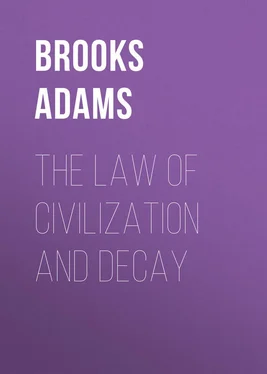Brooks Adams - The Law of Civilization and Decay
Здесь есть возможность читать онлайн «Brooks Adams - The Law of Civilization and Decay» — ознакомительный отрывок электронной книги совершенно бесплатно, а после прочтения отрывка купить полную версию. В некоторых случаях можно слушать аудио, скачать через торрент в формате fb2 и присутствует краткое содержание. Жанр: foreign_antique, foreign_prose, на английском языке. Описание произведения, (предисловие) а так же отзывы посетителей доступны на портале библиотеки ЛибКат.
- Название:The Law of Civilization and Decay
- Автор:
- Жанр:
- Год:неизвестен
- ISBN:нет данных
- Рейтинг книги:4 / 5. Голосов: 1
-
Избранное:Добавить в избранное
- Отзывы:
-
Ваша оценка:
- 80
- 1
- 2
- 3
- 4
- 5
The Law of Civilization and Decay: краткое содержание, описание и аннотация
Предлагаем к чтению аннотацию, описание, краткое содержание или предисловие (зависит от того, что написал сам автор книги «The Law of Civilization and Decay»). Если вы не нашли необходимую информацию о книге — напишите в комментариях, мы постараемся отыскать её.
The Law of Civilization and Decay — читать онлайн ознакомительный отрывок
Ниже представлен текст книги, разбитый по страницам. Система сохранения места последней прочитанной страницы, позволяет с удобством читать онлайн бесплатно книгу «The Law of Civilization and Decay», без необходимости каждый раз заново искать на чём Вы остановились. Поставьте закладку, и сможете в любой момент перейти на страницу, на которой закончили чтение.
Интервал:
Закладка:
Within about sixty years from the final consolidation of the Empire under Augustus, this continuous efflux of the precious metals began to cause the currency to contract, and prices to fall; and the first effect of shrinking values appears to have been a financial crisis in 33 A.D. Probably the diminution in the worth of commodities relatively to money, had already made it difficult for debtors to meet their liabilities, for Tacitus has prefaced his story by pointing out that usury had always been a scourge of Rome, and that just previous to the panic an agitation against the money-lenders had begun with a view to enforcing the law regarding interest. As most of the senators were deep in usury they applied for protection to Tiberius, who granted what amounted to a stay of proceedings, and then, as soon as the capitalists felt themselves safe, they proceeded to take their revenge. Loans were called, accommodation refused, and mortgagors were ruthlessly sold out. “There was great scarcity of money … and, on account of sales on execution, coin accumulated in the imperial, or the public treasury. Upon this the Senate ordered that every one should invest two-thirds of his capital on loan, in Italian real estate; but the creditors called in the whole, nor did public opinion allow debtors to compromise.” Meanwhile there was great excitement but no relief, “as the usurers hoarded for the purpose of buying low. The quantity of sales broke the market, and the more liabilities were extended, the harder liquidation became. Many were ruined, and the loss of property endangered social station and reputation.” 37 37 Ann. , vi. 16, 17.
The panic finally subsided, but contraction went on and next showed itself, twenty-five years later, in adulterated coinage. From the time of the Punic Wars, about two centuries and a half before Christ, the silver denarius, worth nearly seventeen cents, had been the standard of the Roman currency, and it kept its weight and purity unimpaired until Nero, when it diminished from 1⁄84 to 1⁄96 of a pound of silver, the pure metal being mixed with 1⁄10 of copper. 38 38 See Geschichte des Römischen Münzwesens , Mommsen, 756.
Under Trajan, toward 100 A.D., the alloy reached twenty per cent; under Septimius Severus a hundred years later it had mounted to fifty or sixty per cent, and by the time of Elagabalus, 220 A.D., the coin had degenerated into a token of base metal, and was repudiated by the government.
Something similar happened to the gold. The aureus, though it kept its fineness, lost in weight down to Constantine. In the reign of Augustus it equalled one-fortieth of a Roman pound of gold, in that of Nero one forty-fifth, in that of Caracalla but one-fiftieth, in that of Diocletian one-sixtieth, and in that of Constantine one seventy-second, when the coin ceased passing by tale and was taken only by weight. 39 39 Monnaies Byzantines , Sabatier, i. 51, 52.
The repudiation of the denarius was an act of bankruptcy; nor did the financial position improve while the administration remained at Rome. Therefore the inference is that, toward the middle of the third century, Italy had lost the treasure she had won in war, which had gradually gravitated to the centre of exchanges. This inference is confirmed by history. The movements of Diocletian seem to demonstrate that after 250 A.D. Rome ceased to be either the political or commercial capital of the world.
Unquestionably Diocletian must have lived a life of intense activity at the focus of affairs, to have raised himself from slavery to the purple at thirty-nine; and yet Gibbon thought he did not even visit Rome until he went thither to celebrate his triumph, after he had been twenty years upon the throne. He never seemed anxious about the temper of the city. When proclaimed emperor he ignored Italy and established himself at Nicomedia on the Propontis, where he lived until he abdicated in 305. His personal preferences evidently did not influence him, since his successors imitated his policy; and everything points to the conclusion that he, and those who followed him, only yielded to the same resistless force which fixed the economic capital of the world upon the Bosphorus. In the case of Constantine the operation of this force was conspicuous, for it was not only powerful enough to overcome the habit of a lifetime, but to cause him to undertake the gigantic task of building Constantinople.
Constantine was proclaimed in Britain in 306, when only thirty-two. Six years later he defeated Maxentius, and then governed the West alone until his war with Licinius, whom he captured in 323 and afterward put to death. Thus, at fifty, he returned to the East, after an absence of nearly twenty years, and his first act was to choose Byzantium as his capital, a city nearly opposite Nicomedia.
The sequence of events seems plain. Very soon after the insolvency of the government at Rome, the administration quitted the city and moved toward the boundary between Europe and Asia; there, after some forty years of vacillation, it settled permanently at the true seat of exchanges, for Constantinople remained the economic centre of the earth for more than eight centuries.
Similar conclusions may be drawn from the fluctuations of the currency. At Rome the coin could not be maintained at the standard, because of adverse exchanges; but when the political and economic centres had come to coincide, at a point upon the Bosphorus, depreciation ceased, and the aureus fell no further.
This migration of capital, which caused the rise of Constantinople, was the true opening of the Middle Ages, for it occasioned the gradual decline of the rural population, and thus brought about the disintegration of the West. Victory carried wealth to Rome, and wealth manifested its power in a permanent police; as the attack in war gained upon the defence, and individual resistance became impossible, transportation grew cheap and safe, and human movement was accelerated. Then economic competition began, and intensified as centralization advanced, telling always in favour of the acutest intellect and the cheapest labour. Soon, exchanges became permanently unfavourable, a steady drain of bullion set in to the East, and, as the outflow depleted the treasure amassed at Rome by plunder, contraction began, and with contraction came that fall of prices which first ruined, then enslaved, and finally exterminated, the native rural population of Italy.
In the time of Diocletian, the ancient silver currency had long been repudiated, and, in his well-known edict, he spoke of prices as having risen ninefold, when reckoned in the denarii of base metal; the purchasing power of pure gold and silver had, however, risen very considerably in all the western provinces. Nor was this all. It appears to be a natural law that when social development has reached a certain stage, and capital has accumulated sufficiently, the class which has had the capacity to absorb it shall try to enhance the value of their property by legislation. This is done most easily by reducing the quantity of the currency, which is a legal tender for the payment of debts. A currency obviously gains in power as it shrinks in volume, and the usurers of Constantinople intuitively condensed to the utmost that of the Empire. After the insolvency under Elagabalus, payments were exacted in gold by weight, and as it grew scarcer its value rose. Aurelian issued an edict limiting its use in the arts; and while there are abundant reasons for inferring that silver also gained in purchasing power, gold far outstripped it. Although no statistics remain by which to establish, with any exactness, the movement of silver in comparison with commodities, the ratio between the precious metals at different epochs is known, and gold appears to have doubled between Cæsar and Romulus Augustulus.
Читать дальшеИнтервал:
Закладка:
Похожие книги на «The Law of Civilization and Decay»
Представляем Вашему вниманию похожие книги на «The Law of Civilization and Decay» списком для выбора. Мы отобрали схожую по названию и смыслу литературу в надежде предоставить читателям больше вариантов отыскать новые, интересные, ещё непрочитанные произведения.
Обсуждение, отзывы о книге «The Law of Civilization and Decay» и просто собственные мнения читателей. Оставьте ваши комментарии, напишите, что Вы думаете о произведении, его смысле или главных героях. Укажите что конкретно понравилось, а что нет, и почему Вы так считаете.












